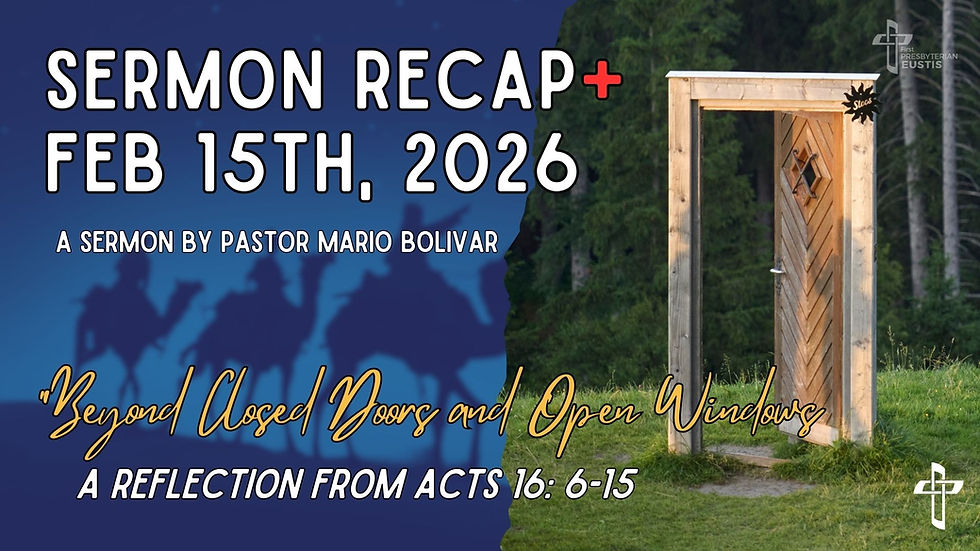Sermon Recap+ Aug 10, 2025
- Mario Bolivar
- Aug 12, 2025
- 3 min read
What would you say if someone asked you what you could brag about? Many of us were taught that bragging is inappropriate, but we all excel at something. The real problem with bragging isn't acknowledging our strengths—it's when we use those strengths to elevate ourselves above others. In Philippians 3:1-11, the Apostle Paul gives us a powerful lesson about what truly matters in life. He begins by listing his impressive credentials—things that gave him status and recognition in his culture.
Paul's Impressive Resume
Paul had quite a list of accomplishments and credentials:
Circumcised on the eighth day
A member of Israel, from the tribe of Benjamin (the ruling tribe)
A Hebrew born of Hebrews
A Pharisee, an expert in the law
Zealous enough to persecute the church
Blameless according to the law's righteousness
By any standard of his day, Paul had an impressive resume. He had status, education, religious pedigree, and moral standing. These were things he could genuinely brag about.
What Makes Our Achievements Worthless?
Yet Paul makes a shocking statement. He says he considers all these impressive credentials as "rubbish" compared to knowing Christ. The things he once valued and took pride in became worthless in light of his relationship with Jesus.
This doesn't mean Paul's education, background, or abilities disappeared. Rather, his perspective on them changed dramatically. Instead of seeing them as sources of personal pride, he began to view them as tools to be surrendered for Christ's purposes.
How Do We Identify Our True Wealth?
We all have wealth of some kind. It might not be financial wealth, but we all possess something valuable: Knowledge, Skills, Talents, Time, Relationships, Resources.
The question isn't whether we have wealth—we all do. The question is what we do with it. Do we hoard it for ourselves, or do we surrender it to Christ for His purposes?
Why Does Hoarded Wealth Become Poison?
James 5:1-6 offers a stark warning about wealth that is kept for selfish purposes. James says that such wealth will rot, rust, and ultimately testify against its owners. When we keep our gifts, talents, and resources to ourselves, they can become toxic in our lives.
This isn't just about money. Any gift or talent that we refuse to surrender to God can become a source of pride, selfishness, or idolatry. Our greatest strengths, when not surrendered to God, can become our greatest weaknesses.
What Happens When We Surrender Our Wealth to Christ?
When we take whatever we excel at and lay it at Jesus' feet, something remarkable happens. God doesn't take our gifts away—He enhances them. Like the loaves and fishes that Jesus multiplied, our surrendered talents and resources can be multiplied for Kingdom purposes. This is illustrated in the parable of the talents (Matthew 25:14-30). Those who invested what they were given saw it multiplied. The one who buried his talent out of fear lost even what he had.
How Can We Use Our Time as Our Greatest Asset?
Of all the resources we have, time may be the most precious. We can't make more of it, and we can't get it back once it's gone. When we surrender our time to God, He can multiply its impact in ways we never imagined. This doesn't necessarily mean working 70+ hours at church. It means being willing to use our time according to God's priorities rather than our own. When we do this, God often expands our capacity and effectiveness.
Life Application
This week, take some time to identify what you can "brag about"—what are your strengths, talents, resources, or opportunities? Then, consciously surrender these things to God for His purposes.
Ask yourself:
What is the one thing I excel at that I could surrender more fully to God?
How might my "wealth" (talents, time, resources) become toxic if I keep it to myself?
What would it look like for God to multiply my surrendered gifts for His Kingdom?
Am I willing to let go of status, success, or recognition to follow Christ more fully?
Remember Paul's perspective: "I regard everything as loss because of the surpassing value of knowing Christ Jesus my Lord." When we adopt this mindset, our wealth becomes a blessing rather than a poison, and God can use it to bless both us and others in ways we never imagined. So, what is worth having is worth sharing. And what is worth sharing is worth celebrating. Will you choose to share your wealth today?





Comments